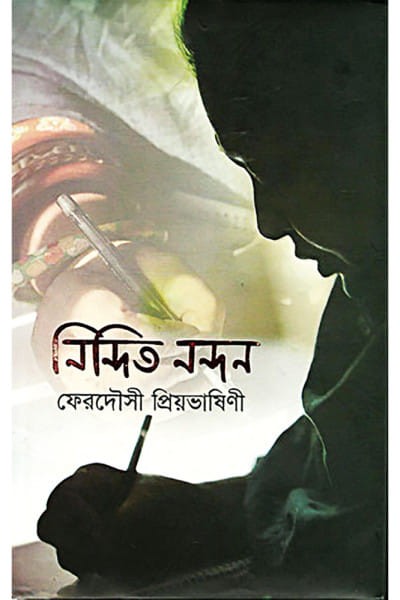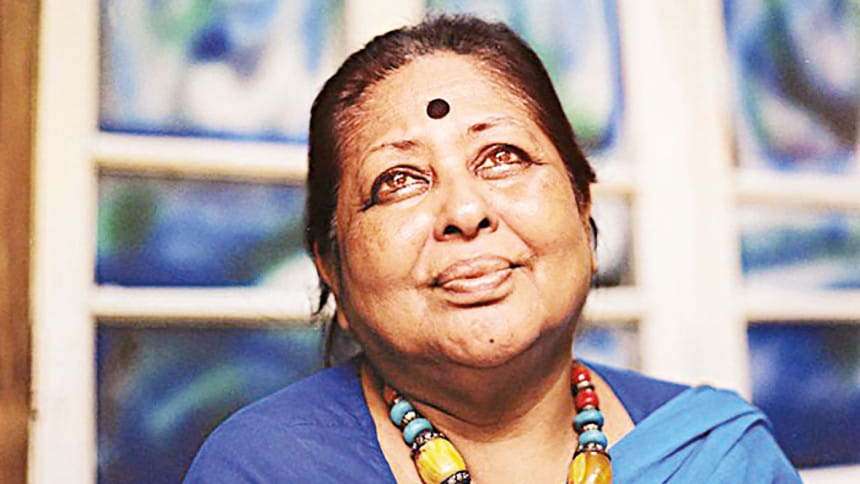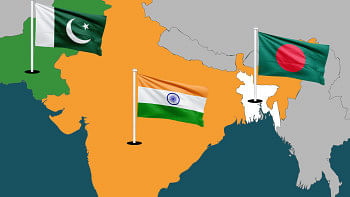The Blighted Garden

I took my leave from the Siraj family, thanking them for their hospitality. I was just a stranger and yet they let me stay with them for weeks. Feeling obliged not to bother them anymore, I decided to go somewhere else. But I did not know where to go. I had no money with me and hadn't changed clothes for weeks. I also did not have a chance to hear the BBC news for the last few days and did not know what the overall situation of the country was. But I was in a desperate need of a new shelter and decided to hit the road without figuring out my destination. I kept walking on the murky road of a village that had been a safe harbor for me for the past few weeks. The road seemed awfully crowded—in fact too crowded for a small village in Khulna. There were people everywhere, strolling listlessly, as if it was a typical April morning and there was no war going on around them. I recognized some of those nonchalant pedestrians and felt curious. "Something is definitely wrong here," I thought to myself. "These people are not locals and have no business in this village. What are they doing here?" I got my answer a few days later when those faces resurfaced as the notorious Razakaars and created a mayhem in that area, killing thousands of innocent people. I spotted brother Jahangir in that crowd, a good colleague of mine, who worked at the accounts section of the jute mill. Jahangir bhai was riding a motorbike. I found his presence in that village a bit intriguing, because he was also not a local. Besides, he was too well dressed to be hanging out with the villagers there. "Is he also looking for a safe shelter, just like I am? Or is he here to drop someone somewhere?" I kept wondering. But seeing a known face in the crowd gave me a sense of relief and I decided to talk to him.
"Jahangir bhai, what are you doing in this village? " I asked, "Where are you heading?"
"Nowhere particularly," he said. "I'm just touring around this place for no reason. But what are you doing here?"
"I was living here for a while, but now I've nowhere to go. I need a place to live. I even have no money with me. If only our office were open, I could have gone there—at least I could work or stay in that building."
"Who said the office is closed? It's running almost in full swing. We're working fulltime. Do you want to come back to work?"
"Yes, I guess," I said, "that'd be a great help."
"Then go get your things. I'll wait here. I'll give you a ride to the office."
"What things?" I said, "I haven't changed clothes for weeks! I have nothing with me."
"At least go get your sandals," he insisted. "You know you can't go to the office barefoot."

"I don't know where I lost them. I've been running from place to place for shelter, and I don't know where to find a pair of sandals right now," I sullenly said. He looked a little puzzled for a second. Then he asked me to sit behind him on his motorbike. But I strongly refused. "I can't ride a bike, I simply don't know how to manage sitting on that thing without falling off."
"Oh, I see, I guess I have to manage a palanquin for you," Brother Jahangir laughed. He hailed a pulled rickshaw and asked me to hop on it. He then asked the rikshaw puller to follow him. I saw a group of Bihari people on the road, throwing rocks and stones at people and cursing loudly. They threw rocks at my direction too. But brother Jahangir drove his motorbike toward them and spent a few minutes talking to them. I did not know what he said, but his words seemed to have worked; they stopped throwing rocks at my rickshaw.
Once we reached the town, he asked the rickshaw puller to stop at the gate of 'Mascot House,' one of the most luxurious buildings in the vicinity. It was a lavish residential home of some rich family, and like many other commoners of that town, I was always charmed with its grandeur and the glamorous lifestyle of its residents. But never in my dream had I imagined myself to be inside that house. I was utterly surprised when brother Jahangir asked me to go inside that house. I agreed to go in thinking that I might be able to procure some fresh clothes or a pair of sandals at least.
Brother Jahangir parked his motorbike by the gate and accompanied me. He asked me to follow him to a room, and the moment I entered that room, he locked the door and jumped on me, grabbing my breasts and pulling my sari. The attack was so sudden that for a second I froze. I did not realize what was going on. The fear of being raped never entered my mind until that very moment. Panicked and in frenzy, I started hitting him and throwing punches at him. The vile animal kept biting me with his vicious teeth as his hands stayed busy molesting me. I grabbed one of his wrists tightly with my mouth and bit him with all my strength. Groaning in pain, the ferocious man pushed me away and left me there on the floor, promising to return in the evening to punish me for my 'misconduct.' I ran to the door the moment he left the room and found it to be locked from outside. I could hear the doormen and the caretakers but none of them came to my rescue. After a while, a young man came to the door and spoke to me in a hushed voice from the other side. "The doormen and the caretakers are planning to assault you, I just overheard them," he whispered. "Please don't drink the tea they are going to offer you. I'm leaving the main door open for you so that you can run away. The army officers will come in the evening. They use this house to rape and torture women." The young man opened the door. "Don't stay a minute longer, my sister. Leave the house immediately." He then left in haste.
My body was sore and I had no strength to lift my limbs. I dragged myself slowly toward the gate.
As I stepped outside the main gate of the house, my knees gave up and I almost fell on the ground. One of the doormen saw me and came running.
"Where are you going?" he asked. "You are to stay here until Mr. Jahangir's return. Let me take you inside!"
I gave him a blank look and lied to him in a cold voice. "I'm going home to bring some fresh clothes. I'll be back shortly." I then got into a rickshaw and asked the man to paddle as fast as he could. The rickshaw puller asked me my destination. But I could not give him any. I had nowhere to go. My children were taken away from me by their father, the man I loved was also far away from me, and so were my mother and my siblings. I did not know how to reach any of them. I was alone, left to bear the burden of my own miseries. There was nothing left for me anymore—no good fortune awaited me—and there could be no misfortunes worse than what had already happened. And yet I survived. And yet I wanted to survive. I needed money and I also needed a place to live. I decided to go back to my workplace. I asked the rickshaw puller to drop me off at the Crescent Jute Mill. If things didn't really work out, then I would embrace death without a flinch. But for now, I wanted to give life one last try.
Ferdousi Priyobhashini (1947-2018) was an eminent sculptor, activist, and a freedom fighter. She penned her experience as a rape survivor of the liberation war of Bangladesh in her memoir, titled Nindito Nandan (2014).
Fayeza Hasanat is an academic, author, and translator. The excerpt is taken from her current translation project: Ferdousi Priyobhashini's Nindito Nandan (The Blighted Garden).

 For all latest news, follow The Daily Star's Google News channel.
For all latest news, follow The Daily Star's Google News channel. 



Comments